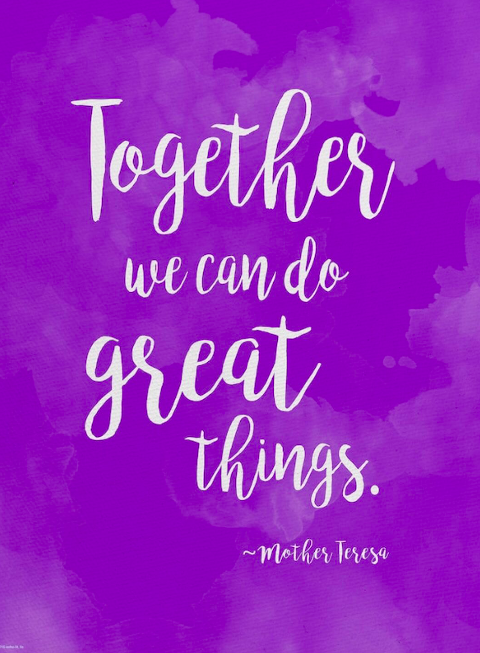The better part of two weeks ago the United States entered into what much of the rest of the world was experiencing with COViD19 and traditional face to face education was turned on its ear. Face-to-face educators went into emergency remote teaching, parents became partners in educating students in a way we have never seen before, and administrators found themselves in a place they have never imagined. I can say that I have never been prouder as an educator.
Teachers reinventing instruction have found ways to connect through Zoom or other methods and are reaching out to one another and supporting each other. Administrators extend grace, maximum flexibility, and hope to their teachers encouraging them that “we can do this.”
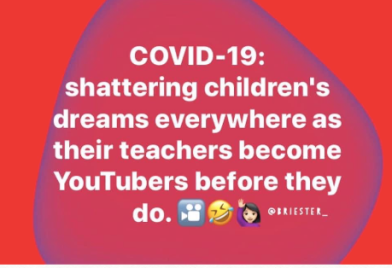
I have worked for a public state on online program for the better part of two years. We partner with face-to-face schools where students take courses at their school through us. With what has happened even our students and teachers have been impacted in tremendous ways. Even with our systems in place, we have experienced struggles right along with face to face teachers moving to emergency remote instruction. What I also know is that what takes place for online learning to be successful is time and a constant vetting of work to become a quality online learning experience. That time is not a luxury we have for emergency remote teaching to catch up.
What I have also learned is that teachers both online and face-to-face are connecting with each other to support one another in this transition, because, ultimately we ALL want ALL our students to succeed. Administrators both face-to-face and online administrators have banded together to support educators and students across this nation. Administrators have been busy, just like teachers, making sure we have every option available to our students and to ensure that there is quality learning going on at every level. We have been innovative, inventive, and gracious. Have we made mistakes? Absolutely. We have never been in a situation like this before.
So to those of you who have been sticking out your neck every day putting in those long hours to reinvent yourself and supporting other educators reinventing themselves so we can be everything we can possibly be and more for our students, thank you.
Many of you have sought support in places you’ve never sought before. You may have reached out on Twitter, Instagram, Facebook, etc. to see what other educators are doing. You may have even posted an idea that you were thinking about or a way to do something to get feedback. You have resourced everything to find out and figure out what’s the best for your students by reaching out across social platforms to get feedback. Keep reaching out.
At the same time, many well-known educational authors and speakers find themselves at home not doing their usual circuit of lectures, professional development series, and/or book promotion. Many of them have provided support, webinars, bonus podcasts, free coaching, and other things and I thank them for that.
However, I have also seen posts where administrators have been shamed for decisions supposedly made that were reported by their teachers. For example, one well-respected educator tweeted about an administrator that supposedly told teachers they need to keep to their 30-minute lunch… stating it was poor leadership. The well-respected educator may have done the research to check the facts. However, what if, perhaps, that administrator had reminded teachers who were working long hours to make sure they take at least a 30-minute lunch, attempting to encourage their teachers to do some self-care? Another well-respected educational author and speaker reposted a teacher’s expectations regarding Zoom sessions and attendance that were considered by his/her standards harsh/excessive. While what was posted did have some needed areas to address, the respected educational speaker and author blasted the teacher for the standards and expectations and encouraged negative and derogatory responses about the educator who created this in the post. That is not #bettertogeter and isolates those who most likely need us the most.
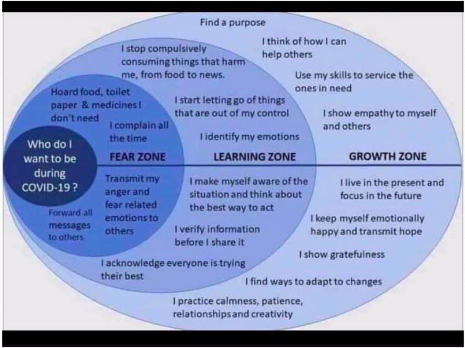
What I want to offer is that teacher, perhaps for the very first time, used Twitter as a way to get feedback. She may have been given a directive to be clear and precise regarding expectations for learning and attendance by her administration and was asked to provide evidence. She may have been grasping and doing her very best and went to Social Media for support. Instead, she had her image picked up, posted, and then blasted by other educators. I want to urge all of us educators, those that are still in the classroom, those that are retired, administrators supporting teachers and students, and those that inspire us through the books, podcasts, webinars, and professional development to come together. Please support one another because we all know that #bettertogether is what we need right now.
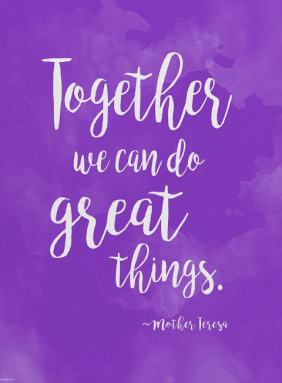
I want to plead with every single professional educator out there right now… administrator, teacher, retired educator, educational author, professional development trainer, and well respected educational Social Media influencer, to, instead of identifying the faults or the things that may not align with our own thinking, to, instead, offer positivity. Work from the mindset of positive presupposition. Instead of assuming ill intent, presume positive intent. Nobody has been in this place before, We are all in this place of an FFT (listen to Brene’ Brown’s “Unlocking Us” Inaugural podcast on FFTs). Instead of narrowing our scope and shooting our arrows at each other, let’s circle the wagons and support one another. If you see an incident of what you feel is bad form, reach out privately through direct messaging/private messaging. Initiate a conversation with positive presupposition, a neutral question about their post, and the intent to build our tribe.
None of us are thinking clearly right now. Normally, we would be functioning from our frontal lobe where you and I make decisions that are in the best interest of our students. However, right now we have our own fears, our own families to consider, and our own concerns about our students who may not be in the best situations. We are thinking for our brain stem, which allows us to survive, but may not necessarily provide us with the best possible solutions to our problems. We all need to be gracious, be kind, and, most of all, be there for one another.
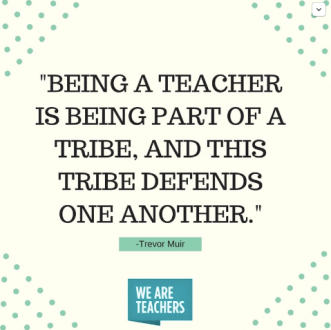
When this is all said and done I would like for our community to say that we came out of this #bettertogether and our students and ourselves are #betterforit.

